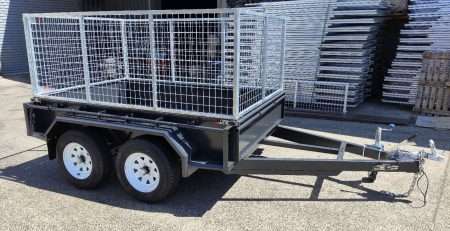
Load Up and Go: Enhancing Efficiency with Car Carrier Load Boards
Understanding Carrier Load Boards
In the world of transportation, load boards play a crucial role in connecting carriers and shippers. These online platforms provide a convenient and efficient way for carriers to find and book loads for transportation. Car carrier load boards specifically cater to carriers who transport cars and other vehicles. Let’s explore what load boards are and how car carrier load boards work.
What are load boards?
Load boards, also known as freight boards or freight matching platforms, are online platforms where shippers can post their available loads and carriers can find and book these loads for transportation. Load boards serve as a marketplace that brings together carriers and shippers, facilitating the exchange of freight and maximising efficiency in the transportation industry.
Car Carrier Load Boards Explained
Car carrier load boards are online platforms that connect car carriers with individuals or businesses who need vehicles transported. These platforms provide a convenient way for carriers to find available loads and for shippers to find reliable carriers. Car carrier load boards offer a wide range of vehicles to be transported, including cars, trucks, SUVs, motorcycles, and boats, allowing carriers to choose the type of vehicles they prefer to transport and expand their business opportunities (J&S Transport).
Carriers can access car carrier load boards to search for available loads based on specific criteria such as origin, destination, type of vehicle, and desired payment. This allows carriers to efficiently find loads that match their capabilities and preferences. Load boards provide detailed information about each load, including the pick-up and delivery locations, vehicle type, payment terms, and any special requirements. This allows carriers to assess the suitability of each load and make informed decisions about which loads to accept (J&S Transport).
Once carriers find a load of interest, they can bid on it or negotiate rates and terms with the shipper through the load board. This bidding and negotiation process enables carriers to secure fair agreements that align with their business objectives. Load boards often have rating systems and feedback mechanisms that allow carriers and shippers to rate and review each other based on their experiences. This helps build trust and ensures that both parties have a reliable and satisfactory transportation experience.
Car carrier load boards provide real-time updates on available loads, allowing carriers to stay informed about the latest opportunities. This real-time information helps carriers maximise their efficiency by quickly finding and booking loads that meet their requirements. Additionally, load boards may offer additional services and benefits, such as load filtering and sorting options, access to market rates, and streamlined load searching and negotiation processes. These features enhance the overall efficiency and effectiveness of using car carrier load boards for transportation purposes.
In summary, car carrier load boards serve as a valuable tool for both carriers and shippers in the transportation industry. They provide a centralised platform for efficient load search and booking, negotiation, fair agreements, and real-time updates on load availability. By utilising car carrier load boards, carriers can expand their business opportunities, optimise their operations, and enhance their overall efficiency in the car transportation sector.
Benefits of Car Carrier Load Boards
Car carrier load boards offer numerous benefits for both carriers and shippers. These platforms streamline the process of finding, negotiating, and booking loads for transportation. Let’s explore some of the key advantages of using car carrier load boards.
Efficient load search and booking
Load boards allow carriers to search for loads based on specific criteria, such as origin, destination, type of vehicle, and desired payment. This targeted search capability saves carriers time and effort by presenting them with a list of available loads that meet their requirements. Carriers can easily browse through the available options and choose the loads that best fit their schedule and preferences. By streamlining the load search and booking process, load boards enhance efficiency and enable carriers to optimise their operations.
Negotiation and Fair Agreements
Carriers can negotiate rates and terms with shippers through load boards, ensuring a fair agreement for both parties. Load boards provide a platform for carriers to submit bids and counteroffers, giving them the opportunity to maximise their earnings and secure profitable contracts. This transparent negotiation process fosters fair competition and allows carriers to build relationships with shippers based on mutually beneficial terms.
Real-Time Updates and Availability
Load boards provide real-time updates on available loads, making it easier for carriers to find and book loads efficiently. Carriers can access the latest information about load availability, pickup and delivery locations, payment terms, and any special requirements. This real-time visibility enables carriers to make informed decisions and quickly secure loads that align with their capabilities and capacity. By staying updated with the latest load information, carriers can optimise their operations and avoid unnecessary downtime.
Car carrier load boards offer a centralised platform for carriers and shippers to connect and collaborate effectively. These platforms provide the tools and features necessary to streamline load search, negotiation, and booking processes. With the ability to efficiently search for loads, negotiate fair agreements, and benefit from real-time updates, carriers can optimise their operations and maximise their business opportunities. Shippers also benefit from the convenience and ease of connecting with reliable carriers through these load boards.
How Car Carrier Load Boards Work
Car carrier load boards serve as online platforms that connect shippers and carriers, facilitating the process of finding and booking loads for transportation. These platforms provide a centralised space where both parties can efficiently connect and collaborate. Let’s dive into the three main steps involved in how car carrier load boards work.
Connecting Carriers and Shippers
Car carrier load boards serve as a bridge between carriers and shippers. Shippers can post their available loads on the load boards, providing essential details such as pick-up and drop-off locations, the type of vehicle needed, and payment terms. Carriers, on the other hand, can search for available loads based on criteria such as pick-up and drop-off locations, dates, and the type of vehicle required (Super Despatch).
Searching for available loads
Once carriers access the load boards, they can search for available loads that match their specific requirements. The load boards typically provide filtering options that allow carriers to refine their search based on parameters like location, distance, and load size. This enables carriers to find loads that align with their capacity and desired routes.
Bidding and negotiating
After identifying a suitable load, carriers can bid on the loads listed on the load boards. Carriers provide their rates and availability to the shipper, initiating the negotiation process. This bidding and negotiation phase allows carriers to showcase their services, pricing, and availability to secure the load. It is important for carriers to present competitive rates and compelling offers to increase their chances of winning the bid.
By utilising car carrier load boards, carriers and shippers can streamline the process of finding and booking loads for transportation. These platforms provide a centralised space where carriers can easily search for available loads and shippers can connect with carriers that meet their specific requirements. This efficient process enhances the overall efficiency of the car carrier industry, benefiting both carriers and shippers alike.
Features of Car Carrier Load Boards
Car carrier load boards offer various features that facilitate efficient communication and transactions between shippers and carriers. These features help streamline the process of finding, booking, and transporting loads. Let’s explore some key features of car carrier load boards.
Detailed load information
One of the primary features of car carrier load boards is the provision of detailed load information. Load boards provide comprehensive details about each load, including pick-up and delivery locations, vehicle type, payment terms, and any special requirements. This information allows carriers to assess the suitability of each load and make informed decisions about which loads to accept. By having access to these details, carriers can efficiently plan their routes and ensure a smooth transportation process. For carriers looking to transport specific types of vehicles, such as enclosed car carriers, load boards provide the necessary information to identify suitable loads.
Rating systems and reviews
Load boards often incorporate rating systems and feedback mechanisms that enable carriers and shippers to rate and review each other based on their experiences. These systems help build trust and ensure that both parties have a reliable and satisfactory transportation experience. Carriers can assess the reputation of shippers based on their ratings and reviews, allowing them to choose trusted partners for their transportation needs. Similarly, shippers can review carriers to determine their reliability and efficiency. This rating and review system fosters transparency and accountability within the car carrier industry.
Additional services and benefits
In addition to load information and rating systems, car carrier load boards may offer additional services and benefits to enhance the user experience. These can include features such as load tracking, document management, and payment processing. Load tracking enables carriers and shippers to monitor the progress of the transportation process in real-time, providing peace of mind and ensuring timely delivery. Document management features allow for the secure exchange of necessary paperwork, such as bills of lading and proof of delivery. Some load boards may also provide payment processing services, simplifying the financial aspect of transactions between carriers and shippers.
By utilising the features of car carrier load boards, carriers and shippers can efficiently connect, negotiate, and execute load transportation. Detailed load information allows carriers to assess load suitability; rating systems and reviews promote trust and reliability; and additional services and benefits streamline the overall process. These features contribute to the effectiveness and efficiency of car carrier load boards, benefiting both carriers and shippers in the transportation of vehicles.
Advantages of Advanced Load Boards
When it comes to finding and securing car carrier loads, utilising an advanced load board offers several key advantages. These advanced load boards provide a range of features and benefits that enhance efficiency and streamline the process for carriers. Let’s explore the advantages of using these advanced load boards.
Real-Time Access to Loads
One significant advantage of advanced load boards is the ability to access real-time information on available car carrier loads. Carriers can quickly find and book loads that match their capacity and preferences, thanks to the up-to-date load listings provided by the load board (Super Dispatch). This real-time access ensures that carriers can efficiently plan their routes and secure loads without delay.
Wide Range of Available Loads
Advanced load boards offer carriers a wide range of available loads to choose from. These loads can include local, regional, and long-haul routes, increasing the chances of finding the right load for their car carrier. The extensive selection allows carriers to diversify their business and find loads that align with their preferred routes and schedules.
Load Filtering and Sorting
Advanced load boards often provide features such as load filtering and sorting. These features enable carriers to narrow down their search and find the most suitable loads based on various factors, including origin, destination, type of vehicle, and payment terms. By utilising these filters, carriers can save time and effort by focusing on the loads that meet their specific requirements.
Streamlined load searching and negotiation
Using an advanced load board streamlines the load searching and negotiation process for carriers. Instead of manually searching for loads and negotiating with shippers, carriers can leverage the load board’s platform to connect with shippers directly. This streamlined process reduces the time and effort spent on manual load searching and negotiation, allowing carriers to focus on maximising their efficiency and profitability (Super Despatch).
Access to Market Rates
An advanced load board provides carriers with access to real-time market rates for car carrier loads. By having this information readily available, carriers can make informed decisions and negotiate fair prices for their services. This transparency ensures that carriers can secure loads at competitive rates, helping them to optimise their revenue while maintaining a fair and equitable agreement with the shipper (Super Despatch).
By utilising an advanced load board, carriers can benefit from real-time access to loads, a wide range of available loads, load filtering and sorting capabilities, streamlined load searching and negotiation, and access to market rates. These advantages enhance efficiency and improve the overall experience for carriers, enabling them to optimise their operations and maximise their success in the car carrier industry.
Author
I am Rahatul Ashiq Tamal. Another author of Muscle Trailers. Muscle Trailers is a well-known trailer brand in Sydney, Melbourne & Adelaide

How to Mount a Spare Tire on Your Trailer: A Simple Step-by-Step Guide
Trailer service centers receive over 1 million phone calls and 1.3 million emails each year about trailer maintenance problems....

How to Fix RV Roof Leaks: Simple Roof Leak Detection Guide for Beginners
Did you know DIY RV roof repairs can cost under $50? But undetected leaks could lead to substantially higher repair...

Starting a Food Truck Business in Australia: From Trailer Selection to Launch
The Australian mobile food market has evolved into a billion-dollar industry. This makes a food truck...
